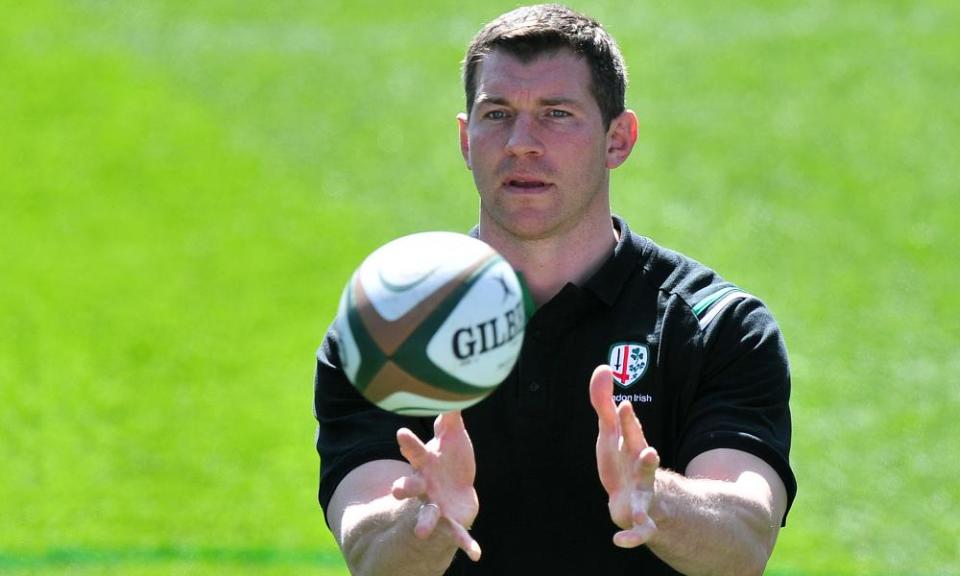London Irish’s Nick Kennedy: time to seize Championship play-offs moment

London Irish have spent all season preparing for Sunday, when their league turns into a knockout tournament. The Exiles, who are looking to return to the Premiership at the first attempt at the end of their only season outside it, are at Doncaster for the first leg of their Championship semi-final play-off.
The team in Irish’s position at the top of the table at the end of next season will be automatically promoted, provided they meet the Premiership’s entry criteria, a costly tangling with red tape Doncaster did not bother themselves with, having worked out that the cost of updating their ground on top of competing with clubs who spent £8m a year on player wages would see them follow London Welsh into insolvency.
Irish and Yorkshire Carnegie are the only two of four play-off clubs to meet the entry criteria, with Ealing Trailfinders not yet prepared for the top flight. Should one of the promotable pair succeed, then the team that fail will have Bristol to contend with next season. For Irish, who had a one-off parachute payment of some £2m a year ago, the financial implications of not going up would be stark given the costs of their training ground, various departments and an academy that is regarded as one of the best in the country.
“All our focus is on the two matches against Doncaster,” says Irish’s director of rugby, Nick Kennedy, the former England lock who salvaged the club’s academy four years ago after the Rugby Football Union threatened to shut it down because it was underfunded. “We will think about the future after that. Everything we have done this season has been geared to the players peaking now and everyone has played fewer minutes than last season because we have rotated so much.
“We want to be the freshest team going into the play-offs. The guys are in great shape and getting their personal bests in the gym now. It will be tense with the stakes high but we have been planning for this for nine months. I have spoken at length to Andy Robinson and Dean Ryan [who coached Bristol and Worcester, respectively, to success in Championship play-offs] and gone back through previous games. We played Doncaster two weeks ago but they rested some of their leading players and you can expect their coach, Clive Griffiths, to throw out the unexpected.”
A decade ago Irish were tilting at the Premiership title. They finished in the top four three times in six seasons and in 2009 were beaten by Leicester by a point in the final, a year after they had reached a European Cup semi-final, losing 21-15 to Toulouse at Twickenham. They were well represented in the England squad with Kennedy, the Armitage brothers, Shane Geraghty, David Paice, Topsy Ojo and Alex Corbisiero winning full caps, later joined by Marland Yarde, Jonathan Joseph and Anthony Watson, all products of the academy; Joseph and Watson, now both at Bath, are touring New Zealand with the Lions in the summer.
After they finished third in 2011 financial problems took hold at a club that did not own its own ground to exploit every week of the year. “A few seasons ago we were underfunded,” says Kennedy. “By 2013 the money we had was invested on the pitch, which took it away from the departments. We lost players because aspiring internationals like JJ, Marland and Anthony want the best strength and conditioning and medical facilities. We have not lost a kid from our academy for the last three years and we want to get promoted and build from here.”
Kennedy turned round the academy, along with his fellow playing colleagues Paul Hodgson and Declan Danaher. One of their graduates, the 19-year-old Joe Cokanasiga, will be with England in Argentina in June. “He is big and fast,” says Kennedy. “I had a heads-up about his selection and, while I was a bit surprised, he is a humble and hard-working young man who is well supported by his family. I have known him for three years and he has always been someone who works before and after training.
“I am a big believer in the academy system and we have some exciting talent coming through. My only concern is that it becomes a race to the bottom, as in football, with teams trying to sign players at a younger and younger age. I like the county boundaries – we have just taken over Middlesex from Wasps [now in Coventry], which has increased our academy by 40% – and hope clubs stick to them.
“We believe you have to play rugby to get better. When I was coming through, some guys would not play a game for two years because there was nothing for them, while others would turn up at a loan club in a Mercedes thinking they deserved a game. We make our boys train with us in their day and their loan sides on two nights a week. They need to earn their starting spot and learn to become part of a team. Playing is so important because at that age you have to find out the hard way and there are some top coaches in the national leagues.”
There was anguish last season when Irish’s relegation was confirmed. It meant job cuts and a period of uncertainty but a year away from the Premiership worked for Harlequins and Northampton in the 2000s, both making an immediate return and winning the title within seven years.
“We will have to wait a few years to see if relegation has had any benefit,” says Kennedy. “It has been good to change losing habits and it is easier to work on your environment when you are winning. We have been able to blood young players but we just want to get up and reward our supporters who have been unbelievable this season.”

 Yahoo Sports
Yahoo Sports 